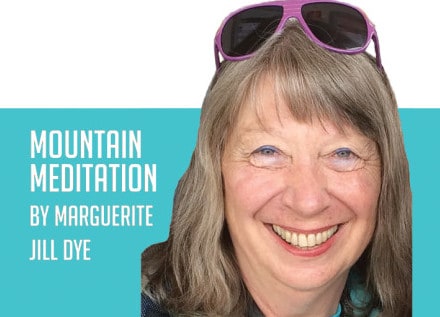By Marguerite Jill Dye
One might assume the mind-body connection would be obvious once we become ill, but sometimes we’re too busy chasing symptoms to see their significance in our lives. Louise Hay’s book, “You Can Heal Your Life,” lists ailments with their emotional roots. It provides deep insights into how our minds and emotions affect our health.
I’ve been reading about the mind-body connection for some time yet was blindsided, once again. I’m still trying to  identify what made me sick with a series of three fairly common health conditions — nothing severe but all related and occurring like falling dominoes. After seeking out diagnosis (some inaccurate) and treatment from scattered practitioners and an urgent care center, I finally discovered a health care practice focused on the mind-body philosophy, preventive medicine, and “restoring humanity to health care” (Iora Health). Prior to my initial entry visit they squeezed me in on an emergency basis to see an outstanding nurse practitioner, who took the time to analyze my conditions.
identify what made me sick with a series of three fairly common health conditions — nothing severe but all related and occurring like falling dominoes. After seeking out diagnosis (some inaccurate) and treatment from scattered practitioners and an urgent care center, I finally discovered a health care practice focused on the mind-body philosophy, preventive medicine, and “restoring humanity to health care” (Iora Health). Prior to my initial entry visit they squeezed me in on an emergency basis to see an outstanding nurse practitioner, who took the time to analyze my conditions.
When she asked about my magnesium intake and if I keep a gratitude journal, I knew I’d found the ideal practice for me. The doctor I chose worked with the Indian Health Service and at Harvard. Being seen by a proactive team with a holistic approach that empowers the patient eased my concerns and helped me heal faster.
Then I jotted down a couple of dreams (which I rarely remember), and ran them by a Jungian psychotherapist to see what they might signify. In the first dream, in semidarkness, I was standing by a raging river after a giant downpour. I watched the muddy water rush past, then gradually diminish a bit. I turned around and began to climb up the high, steep, sandy embankment. But the soft wet sand was becoming so hard, once the water had soaked in, that I couldn’t dig for hand- or footholds, climb up, or back down. I called out to my husband, Duane, asleep in a house high above for help, but he couldn’t hear me. Then I awoke.
My successive dream was climbing upstairs to the rooftop of a European monastery. My husband had handed me eight bottles to carry. I struggled to hold them, but some kept falling and Duane wouldn’t help me. We followed a line of pilgrims to the red rooftop where a difficult traverse to the adjacent roof led to a source of holy water. We were in a dangerous location at the edge of the roof when I awoke, angry with my poor husband!
The Jungian psychotherapist said, “Stress is depleting your immune system,” and that when I approached the raging river (my unconscious) in my dream to be close to it, I couldn’t go back up the riverbank and return to the light. It was a dangerous mission. I discovered that a turbulent, raging, and overflowing river represented feeling emotionally unsettled and that life is out of control. The muddy river signified feeling tired, lethargic, and ill.
Although my husband didn’t rescue me, the Jungian explained, he wasn’t to blame. Any male in my dream would represent the male side of myself, my “animus,” and show that I am not communicating with my inner masculine side of reality and practicality. (How true!)
In my second dream the holy water represented the need for tranquility, spiritual cleansing, and rejuvenation. Entering a monastery represented a need for self-reflection and exploration of my masculine side. The roof symbolized a barrier between two states of consciousness. I feared falling off the rooftop (lacking a firm grip or solid foundation) while trying to get onto the rooftop (of boundless success). Crossing from rooftop to rooftop would mean staying the course. There is no turning back.
To me, these dreams represent the quandary I’m in: to write about spirit, nature, healing, and creativity, all subjects I love, or also to expose injustice through compelling issues and needs to which I’m often led. I write with my head, heart, and soul and feel guided to write what I write. But sometimes difficult subjects I explore affect my well-being and leave me feeling zapped. Highly Sensitive People (HSP), or empaths, absorb others’ grief or pain, symptoms and feelings.
The Jungian said, “It’s rather like shamans who take on others’ illnesses in their healing work.”
He suggested I limit my involvement and choose subjects that don’t upset me. Meanwhile, I need to develop better defenses to tackle emotionally laden issues and to address them in more manageable parcels.
“You need to balance your life more with fun stuff,” the Jungian concluded. For a healthy body-mind connection, perhaps that’s a universal prescription!
Marguerite Jill Dye is an artist and writer who divides her time between Vermont and Florida’s Gulf Coast.



